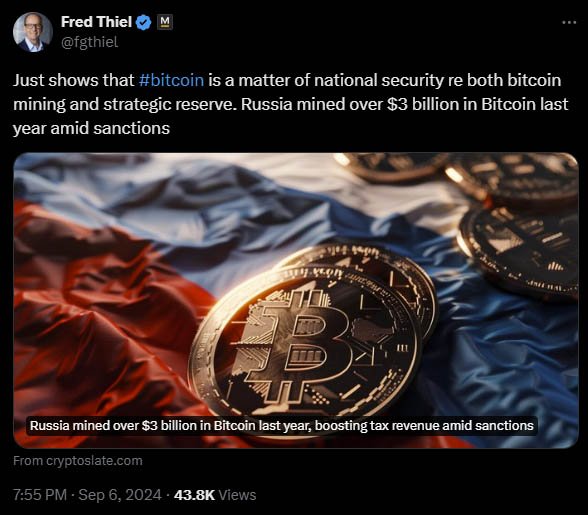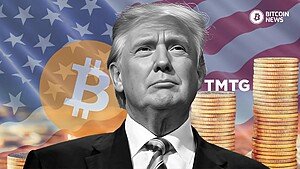Russia’s Bitcoin mining activities have come under the spotlight recently, with reports revealing that the country mined over $3 billion worth of bitcoin last year.
This development has raised eyebrows and sparked debates about the implications of Bitcoin on national security, especially amid ongoing Western sanctions. On X social platform, this discussion was recently brought forth by Fred Thiel, the CEO of Marathon Digital.

According to Sergey Bezdelov, Director of Russia’s Industrial Mining Association, Russia mined around 54,000 bitcoin (BTC) in 2023, worth over $3 billion.
This mining activity generated about 50 billion rubles, or $556 million, in tax revenue for the Russian government. Bezdelov shared these figures during a mining session covered by the Russian news outlet Izvestia.
Although the revenue from Bitcoin mining is less than 1% of Russia’s $2.27 trillion Gross Domestic Product (GDP), it represents a significant source of income for the country, particularly given its economic challenges under Western sanctions.
As Fred Thiel, CEO of U.S.-based Bitcoin mining company Marathon Digital Holdings (MARA), stated:
“This just shows that bitcoin is a matter of national security, both bitcoin mining and strategic reserve. Russia mined over $3 billion in Bitcoin last year amid sanctions.”
Fred Thiel’s comments highlight growing concerns in the U.S. about the role of Bitcoin in international politics and economics.
Thiel argues that Bitcoin mining and strategic reserves have become matters of national security, suggesting that countries could use the digital asset to bypass traditional financial systems and sanctions.
Related: Senator Lummis to Propose Bitcoin Reserve Bill at Nashville Conference
This sentiment comes after Russia’s recent push to legalize Bitcoin mining and integrate Bitcoin into its economy. In July, the State Duma (the lower house of the Federal Assembly of Russia) passed a bill that legitimized Bitcoin mining and allowed the use of digital assets in international trade.
This new law recognizes Bitcoin mining as a legitimate economic activity and requires entities engaged in it to comply with specific regulations, such as registering and adhering to energy consumption limits.
The legalization of Bitcoin mining in Russia is seen as part of a broader strategy to mitigate the effects of Western sanctions. Russia’s government is exploring ways to use Bitcoin to maintain economic stability and facilitate international trade, even as traditional financial channels become restricted.
Blockchain analytics firm Chainalysis has raised concerns that Russia could be using local digital asset exchanges, like Garantex and Exved, to evade sanctions.
According to Chainalysis, Garantex, a sanctioned exchange, has processed nearly $100 billion in transactions since 2018 and has deep liquidity across major blockchains, potentially allowing Russia to maintain cross-border trade. Chainalysis noted:
“Garantex is a central player in Russia’s crypto market and is likely to remain instrumental despite its designation by the Office of Foreign Assets Control (OFAC) and Office of Financial Sanctions Implementation (OFSI) in the U.S. and UK, respectively.”
While Russia’s use of Bitcoin and other digital assets offers a potential way to circumvent sanctions, it also faces significant hurdles.
Chainalysis points out that large-scale evasion efforts are likely to encounter challenges, especially as Western nations closely monitor and sanction any associated wallet addresses.
Additionally, the logistics of using Bitcoin at a national level are complex.
Chainalysis highlighted, “On-chain sanctions evasion at scale remains highly improbable, given Russia’s total foreign exchange reserves are just under half a trillion dollars, …Wallet addresses associated with CEXs, mining services, and other on-chain entities can be identified, attributed, and potentially sanctioned.”
This means that while digital assets could offer some relief, they are unlikely to replace traditional financial methods entirely.
The United States is not standing still in response to these developments. The approval of Bitcoin Spot Exchange-Traded Funds (ETFs) by the U.S. government represents a move toward greater regulatory clarity and acceptance of the digital asset.
Former U.S. President Donald Trump even suggested the possibility of establishing a national strategic reserve of Bitcoin if re-elected, indicating that digital currencies are increasingly being viewed through a national security lens in the U.S.
Related: Bitcoin Trumps Politics
Fred Thiel of Marathon Digital Holdings has emphasized the importance of both Bitcoin mining and strategic reserves to national security, comparing it to the way the U.S. holds gold in Fort Knox.
He argues that, like gold, Bitcoin could become a critical component of a nation’s financial reserves in the future.
As the geopolitical landscape evolves, Bitcoin is likely to play an increasingly prominent role. Russia’s $3 billion Bitcoin mining operation shows how digital assets can be leveraged to gain an economic edge, even under strict international sanctions.
However, this strategy also comes with risks and uncertainties.
For now, the debate continues over whether Bitcoin will become a cornerstone of national security strategies or remain a volatile and unpredictable financial tool.
What is clear, however, is that countries like Russia are willing to explore every avenue to navigate their economic challenges, and Bitcoin is becoming a significant part of this exploration.










